Index relies entirely on the support of donors and readers to do its work.
Help us keep amplifying censored voices today.
[vc_row][vc_column][vc_single_image image=”116457″ img_size=”full” add_caption=”yes”][vc_column_text]Of the “gang of four” who signed the documents establishing the Writers and Scholars Education Trust fifty years ago on 25 March 1971, Peter Calvocoressi perhaps embodied the spirit of that trust more than the other three. He was both writer and scholar. And many things besides.
In 1968, Calvocoressi published what became the definitive work on post-war global history, World Politics Since 1945. The book, which the Sunday Times called “masterly”, has remained in print ever since and stretches to almost 900 pages.
It is one of more than 20 books he wrote during his lifetime, which stretched from a Who’s Who in The Bible to Suez: Ten Years After.
His academic credentials were equally impressive: he was Reader in International Relations at the University of Sussex, a post created especially for him.
The Calvocoressi name hints at his most international of upbringings. He was born in Karachi, in what is now Pakistan, but then was British India, making him a British subject. However, in one of his autobiographical works he considered himself “entirely Greek”, being part of the Ralli family who left the Aegean island of Chios in the 19th century diaspora.
Peter’s parents moved to London in 1910 and he was born two years later. Peter was educated at Eton and Balliol College, Oxford where he got a first in modern history.
He was called to the Bar in 1935 and shortly thereafter was recruited into the Ministry of Economic Warfare, based at the London School of Economics.
Soon after the start of the Second World War, Calvocoressi resolved to volunteer to become more active in the war effort. After a day of tests at the War Office he was told he was “no good, not even for intelligence”.
That conclusion proved to be very wrong. Soon after, through a contact, he was interviewed by the Air Ministry and shortly after became an RAF intelligence officer. In 1942, his gift for languages saw him plucked out for duty to Bletchley Park, the wartime home of the Allied codebreakers.
There he worked in the famous Hut 3, which decrypted messages from Germany’s Enigma machines and passed intelligence, known as Ultra, to the Allies’ military commanders. His time at Bletchley, where he went on to lead Hut 3, is described in his revelatory book Top Secret Ultra, published in 1980, shortly after the activities of the Allied codebreakers were first made public.
After the war, Calvocoressi was asked to participate in the Nuremberg Trials, helping obtain evidence for the Allied prosecution team and in which he cross-examined former German Field Marshal Gerd von Rundstedt.
Calvocoressi spent much of the Fifties researching and writing his Survey of International Affairs series, revealing his firm grasp of global politics and international relations.
He was asked to join the council of the International Institute for Strategic Studies in 1961 and later was instrumental in the early years of Amnesty International.
In 1967, he was called on as an independent expert to find out whether Amnesty had been infiltrated by British intelligence agents – his investigation proved that it had not. He steadied the ship at the organisation and served on its board from 1969 to 1971.
Throughout the decade, Calvocoressi was a member of the UN’s Commission on discrimination and the protection of minorities and became a member and chairman of the Africa Bureau, which lobbied against apartheid, at the request of his friend David Astor, owner and editor of The Observer.
Calvocoressi’s international experience and erudition made him an obvious choice to be asked to help found the Writers and Scholars Educational Trust, the organisation that is today better known by its working name of Index on Censorship.
Calvocoressi contributed to Index’s work in the early years but the world of publishing came calling.
He became a partner in publishers Chatto & Windus and Hogarth Press and was later asked to be chief executive of Penguin Books, a position he held until 1976. He continued his prodigious writing output throughout the Eighties and Nineties.
He had strong freedom of expression values too. He believed in the freedom to publish – writing a book of the same name which Index published in 1980.
He also believed in the freedom of the press but not at any cost.
In the case of the Pentagon Papers, the revelations around US involvement in the Vietnam War, he wrote to the Sunday Times about the decision of US newspaper editors to publish them.
He wrote: “The newspapers maintained that they were entitled to print the Pentagon Papers because the documents had come into their possession and they themselves judged that publication could not harm national security.
“But is an editor in a position to judge this? Surely not, for he cannot know enough of the background to tell whether he is giving something away.”
“Governments must have secrets whether we like it or not, and the power to preserve them. I am not denying that our own government overdoes the secrecy, sometimes absurdly so.”
What readers of that letter did not know, of course, was Calvocoressi’s personal involvement in the biggest secret of the war: the codebreaking at Bletchley Park.[/vc_column_text][/vc_column][/vc_row]
[vc_row][vc_column][vc_single_image image=”116366″ img_size=”full” add_caption=”yes”][vc_column_text]West Wing writer Aaron Sorkin has taken another foray into the world of American politics with The Trial of the Chicago 7, starring Sacha Baron Cohen, Eddie Redmayne and Mark Rylance. The film delves into the trial of seven activists arrested for inciting violence during clashes with police that resulted from protests against the Vietnam War at the 1968 Democratic National Convention; it is a reminder of the importance of a fair trial.
Similar in tone, then, to BAFTA’s best film nominee The Mauritanian (pictured above) and the story of Mohamedou Ould Salahi.
Salahi was imprisoned in Guantanamo Bay due to perceived connections with terrorist group al-Qaeda for more than 14 years without charge until his eventual release in 2016.
In 2005, Salahi wrote a memoir that was eventually published in 2015 with numerous redactions and is the basis of the film.
Forty prisoners still remain at the camp and most have not been charged or tried with any crime. Despite this, as the film shows, legal challenges are deliberately stifled for political purposes.
President Joe Biden has committed to close the camp by the time he leaves office.
There are several recent documentaries that celebrate the crucial work of investigative journalists.
Collective is remarkable film about corruption and political cover-up at the heart of Romanian institutions.
In 2015, a fire broke out at Colectiv night club in Bucharest, resulting in the deaths of 64 people. Hospitals were overwhelmed by the casualties and the deaths of 13 of the victims were attributed to bacterial infections that arose from being treated with watered down disinfectant used to save money. The story would have been forgotten had it not been for the tireless work of a daily sports newspaper. The ordeal exposed corruption and corner-cutting that fuelled anger on the streets of Romania. Protests eventually led to the resignation of Prime Minister Victor Ponta.
During the film, lead investigator for the paper Catalin Tolontan says of the situation: “When the press bows down to authorities, the authorities will mistreat the citizens.”
Collective is an insight into how teams of journalists break such stories
Athlete A is another testament to the power of investigative journalism.
Over recent years, numerous scandals have revealed the toxic atmospheres of some elite sports teams. None more so, perhaps, than the sexual abuse of US gymnasts shown in Athlete A. The Indianapolis Star helped uncover victims’ stories of sexual abuse by USA team gymnastics doctor Larry Nassar, who was found to have assaulted at least 265 girls over a period of two decades. The film’s title refers to Maggie Nichols, the gymnast who reported her experiences in 2015, only to be dropped from the 2016 Olympics team shortly after.
Collective and Athlete A highlight the lengths governments and organisations will go to keep quiet such scandals.
More extreme examples can lead to deaths, such as the brutal killing of Jamal Khashoggi, investigated in The Dissident.
Khashoggi was a US-based journalist and columnist for the Washington Post and was murdered inside the Saudi Arabian consulate in Istanbul, Turkey. The CIA eventually determined the killing was premeditated and ordered by Crown Prince Mohammed bin Salman.
After its release in January 2020, producer Thor Halvorssen alleged there were attempts by “Saudi-backed trolls” to reduce its score on film-rating sites IMDB and Rotten Tomatoes to below 70 per cent.
“The moment you drop under 70 per cent, your film is essentially dead,” Halvorsson told Variety at the time. “People who follow individual critics will watch it; but the regular public will not.”
Public pressure that arises as a result of the revelations of the press are important, democratic displays of dissent. Their value is emphasised when authorities try to take away such expression.
Protests over a proposed extradition law allowing people in Hong Kong to be sent for trial in mainland China began in 2019. The law was met with such hostility by people in Hong Kong, that China eventually brought in the controversial National Security Law, criminalising any act of secession, subversion, terrorism, and collusion with external forces.
The citizens of Hong Kong have suffered under the law, as have the press. On 6 January, 53 pro-democracy activists were arrested by Chinese authorities.
Do Not Split – which takes its name from a Cantonese phrase which translates loosely as “Do not split, do not divide, do not snitch on others” – follows the course of the early protests up to the imposition of the law that now threatens freedom in Hong Kong.[/vc_column_text][/vc_column][/vc_row][vc_row][vc_column][three_column_post title=”You may also want to read” category_id=”581″][/vc_column][/vc_row]
[vc_row][vc_column][vc_column_text]Index on Censorship was established in 1972 in a febrile period: Idi Amin had taken power in Uganda, the Vietnam war continued, direct rule was imposed in Northern Ireland, there was a coup in Bolivia and Congo was renamed Zaire by its dictator president. As writer Robert McCrum said in our 40th anniversary issue: “The abuses of freedom worldwide in the 1970s were so appalling and so widespread that the magazine rapidly found itself in the frontline of campaigns. Index became a clarion voice in the cause of free expression.” The right to protest and freedom of expression are now being sought in Hong Kong and elsewhere, and Index is still to the forefront in reporting abuses. Here are just some of the conflicts between freedom and dictatorship we have reported on in the past 47 years.
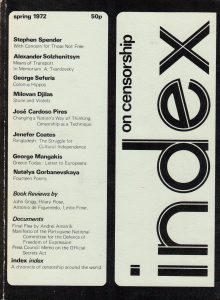
The first issue of Index on Censorship magazine, in March 1972
The Clockwork Show vol 1, issue 1, March 1972
In an anonymous article about life in Greece under the regime of the Colonels’ junta, the writer considered the psychology of the situation; the feelings and attitudes, the long-ranging impact of this harrowing experience. “There is nothing more demoralizing than to be bound to a public body, an administration, a government with which one can never for a moment identify, which is the exact opposite of everything one believes in. One cannot live side by side with Philistinism, chauvinism, bigotry, blatant hypocrisy, crass ignorance, injustice, violence and brutality and not be affected by them, even if one manages—only just—to keep them out of one’s own life. Under this regime there is no relief; no exception: the regime has penetrated every single aspect of public life.”
Read the full article
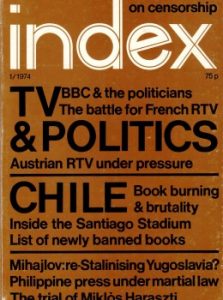
March 1974: TV, politics and Chile Index on Censorship magazine
Book burning and brutality vol 3, issue 1, March 1974
A fascinating insight into life in Chile six months after a coup ended the tyranny of President Salvador Allende: worse was to come under a military dictatorship, reported Michael Sanders, an Englishman in Santiago. “When Allende left Chile to address the UN in December 1972, a leading opposition newspaper had as its front-page a photo depicting the president flushing himself down a lavatory, with the caption ‘ good riddance’. The contrast in December 1973 is gloomy indeed. Not so much, or not only because of the drab uniformity of censored newspapers that, for all they may be censored, willingly reflect the views of the Military Junta. But for the fact that 43.6% of the population have been deprived of all means of expression, of all normal communication, and live in daily fear of their lives and jobs.”
Read the full article

Russia, East Germany, South Africa: May 1979 Index on Censorship magazine
Black journalists under apartheid volume 8, issue 3, May 1979
William A Hachten reports: Black journalists came to the fore in the Soweto riots of 1976 when they reported from the ghetto for a white press without access. Yet black journalists still faced daily harassment under apartheid, which worsened with the death of Steve Biko in 1977. Vusi Radebe, a black stringer for the Rand Daily Mail, said: “The situation is worse since the 1976 riots. Police will beat up reporters on the slightest provocation for what they consider obstruction of justice.” While whites had 23 newspapers, there were none for non-whites to express their political frustration. Black journalist Pearl Luthuli said: “The black journalist can’t be objective. We try to tell it like it is but the white editors won’t print it.” Another said: “We are black people first, journalists second. If it comes to a conflict between the struggle and the job, the struggle comes first.”
Read the full article

Beckett and Havel: Index on Censorship magazine, February 1984
Iran under the party of God, volume 13, issue 1, February 1984
“Censorship was planned by the regime of the Islamic Republic even before the February 1979 revolution brought Ayatollah Khomeini’s theocratic oligarchy to power. This particular kind of censorship may not be without precedent in history, but it must certainly be rare. There were attacks on coffee-houses, restaurants and other public places by men armed with clubs and stones; unveiled women were harassed; slogans of the opposition were cleaned from the walls; banks, cinemas and theatres were burned” – a personal account of the first years of the revolution and its attack on culture, by one of Iran’s leading writers Gholam Hoseyn Sa’edi. “And it keeps on happening. The Islamic regime of today has gone a step beyond censoring the creations of science, culture and art, beyond censoring life itself: it has rendered life vain and all but unliveable.”
Read the full article

Romania, Albania, USSR: Index on Censorship magazine January 1991
A sense of solidarity, volume 20, issue 1, January 1991
Romania’s celebrated poet, Ana Blandiana, on censorship under Ceausescu and how she fought back. Her work was completely banned three times. “In my case, the form of censorship progressed from the banning of a word to that of a line, then of a poem, then of a book, to the total erasure of my signature as author: an eradication of identity. My inner freedom was assured by a decision I took in 1980, a personal one rather than as a writer. I decided to be outspoken and say what I thought at the risk of becoming a victim myself, rather than suspect a possibly honest person. At first it kept me sane, and then it helped me to be a normal writer, relatively free of self-censorship. This was the strongest form of censorship under Communism in the last 10 or 15 years, and was much more refined and subtle than the official censorship.”
Read the full article
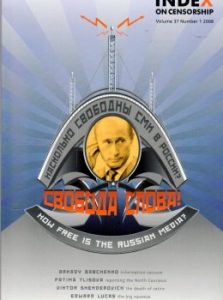
How free is the Russian media? Index on Censorship, Spring 2007
The Big Squeeze, volume 37, issue 1, Spring 2008
“The fact remains that since the departure of the oligarchs, Russian media freedom has gone from the imperfect and beleaguered to the moribund. At national television, which 90 per cent of Russians say is their main source of news, editors receive weekly or even daily instructions from the Kremlin on the ‘line to take’ on important stories; around half of Russian viewers think that what they watch is objective, a 2007 poll said. Foreign coverage is polemical and outrageously politicised. The message of all this is ‘be quiet’. If you annoy the rich and powerful you face threats, beatings or death. Even when the Kremlin is not directly involved, its reaction to the persecution of journalists sends a clear message: if you offend the powerful, don’t expect the law to protect you.” Edward Lucas gave an early taste of what freedom of expression meant under Putin.
Read the full article
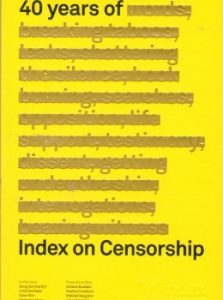
40 years of Index on Censorship March 2012
Grit in the engine, volume 41, issue 1, Spring 2012
Robert McCrum on the 40th anniversary of Index on Censorship. “The success of Index was not a foregone conclusion. Stephen Spender, its founder, was fully alert to the potential for windbaggery and failure. There was, he wrote, ‘the risk that the magazine will become simply a bulletin of frustration’. Actually, the opposite came to pass. Index became a clarion voice in the cause of free expression. The abuses of freedom worldwide in the 1970s were so appalling and so widespread that the magazine rapidly found itself in the frontline of campaigns. Perhaps the most important thing Index did, from the beginning, was to universalise an issue in peril of becoming a special interest: freedom was not ‘a luxury enjoyed by bourgeois individualists’. Along with self-expression, it was a human right, and an instrument of human consciousness.
Read the full article
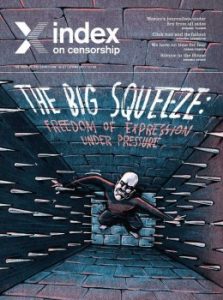
The big squeeze: Index on Censorship magazine Spring 2017
Freedom of expression under pressure, volume 46, issue 1, Spring 2017
The spring 2017 issue of Index on Censorship magazine looks at how pressures on free speech are currently coming from many different angles, not just one. Special features on how to spot fake news, articles from former BBC World Service director Richard Sambrook and former UK attorney general Dominic Grieve, an exclusive interview with the Spanish puppeteer arrested last year, and fiction from award-winning writer Karim Miské.
[/vc_column_text][/vc_column][/vc_row]
[vc_row][vc_column][vc_video link=”https://www.youtube.com/watch?v=ewRjZoRtu0Y&list=PLlUhPA3TuB56RH9Ly-mqvPHDVBHZ42gyL&index=3&t=0s”][vc_column_text]
[/vc_column_text][/vc_column][/vc_row][vc_row][vc_column][vc_column_text]
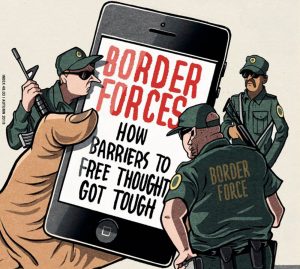
[/vc_column_text][/vc_column][/vc_row][vc_row][vc_column][vc_basic_grid post_type=”post” max_items=”4″ element_width=”6″ grid_id=”vc_gid:1568990225205-426f193c-fdf1-1″ taxonomies=”7819″][/vc_column][/vc_row]